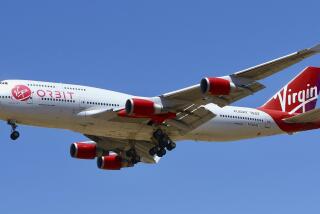Lockheed Joins Russian Firm in Space Venture : Aerospace: Companies will sell commercial launch services with the Proton rocket. Protests from U.S. manufacturers are predicted.
In the most significant linkup so far between American and Russian defense firms, Lockheed and Khrunichev Enterprise of Moscow announced Monday that they have formed a joint venture to sell commercial launch services with the Russian Proton rocket.
The alliance combines two Cold War industrial adversaries: Lockheed, the largest U.S. manufacturer of military space hardware, and Khrunichev, one of Russia’s leading state-owned aerospace operations.
Lockheed Vice President Mel R. Brashears said the joint venture will initially focus on launching commercial satellites and will eventually aim at manufacturing and selling other space services and products.
“We clearly see this as a very significant undertaking and a long-term relationship,” Brashears said. “The Proton is just the first product or service we would offer.”
But the Proton business is likely to elicit sharp protests from U.S. rocket makers, among them McDonnell Douglas in Huntington Beach, Martin Marietta Astronautics in Denver and General Dynamics in San Diego. U.S. policies have sharply limited the number of American-made satellites that can be launched by Russian or Chinese booster rockets. The U.S. industry has complained that government-subsidized space programs in those countries pose unfair competition for American firms.
McDonnell Douglas launched 11 of its Delta II rockets during 1992, generating about $50 million in revenue for each one. The Proton rocket will not compete directly with the Delta II, however, which carries a 4,000-pound payload, about twice the weight carried by the Proton.
“The only concern we have as a manufacturer of launch vehicles is that fair-market pricing be negotiated and that some type of government policy come forward as we do joint ventures with the Russians,” said Tom Williams, spokesman for McDonnell Douglas in Huntington Beach.
Such a policy is necessary, he said, to ensure protection for U.S. jobs and technology. “If there is fair-market pricing,” Williams said, “then we can compete.”
General Dynamics officials have testified before Congress against opening the U.S. market to foreign-made launch vehicles. “We feel it is important for the U.S. government to protect the interest of the American launch industry,” company spokesman Al Spivak said Monday.
But Lockheed is counting on that effort failing. “We eventually believe the policies will have to change,” Brashears said.
Lockheed and Khrunichev said their deal is an effort to “move toward defense conversion,” an idea many U.S. defense executives have disparaged as a liberal agenda. The State Department approved the deal last week, and Russian Prime Minister Viktor S. Chernomyrdin gave his approval earlier this month. The deal was negotiated last September and October.
By entering the joint venture, Lockheed will put its imprimatur on the Russian hardware. Brashears said the Proton can lift into orbit nearly as much as Martin Marietta’s Titan IV rocket and has a record of reliability roughly equal to McDonnell’s Delta rocket. The Proton has had two failures in 200 launches, he said.
Khrunichev also makes the Russian Mir space station, as well as the SS-18 nuclear missile system. Lockheed is the leading U.S. supplier of spy satellites and makes the Trident II nuclear missile. Under the joint venture, the newly formed Lockheed Commercial Space Co. would prepare and integrate satellites into the Russian Proton rocket.
Lockheed did not disclose the potential size of the joint venture, but the international commercial launch market is worth several hundred million dollars annually. The overall commercial space market is worth about $2.5 billion annually.
Brashears said he expects that to grow tenfold over the next decade--an estimate that far exceeds those from other experts.
More to Read
Inside the business of entertainment
The Wide Shot brings you news, analysis and insights on everything from streaming wars to production — and what it all means for the future.
You may occasionally receive promotional content from the Los Angeles Times.











